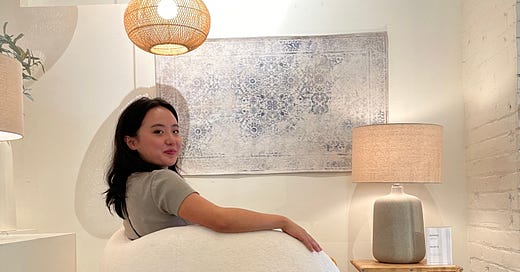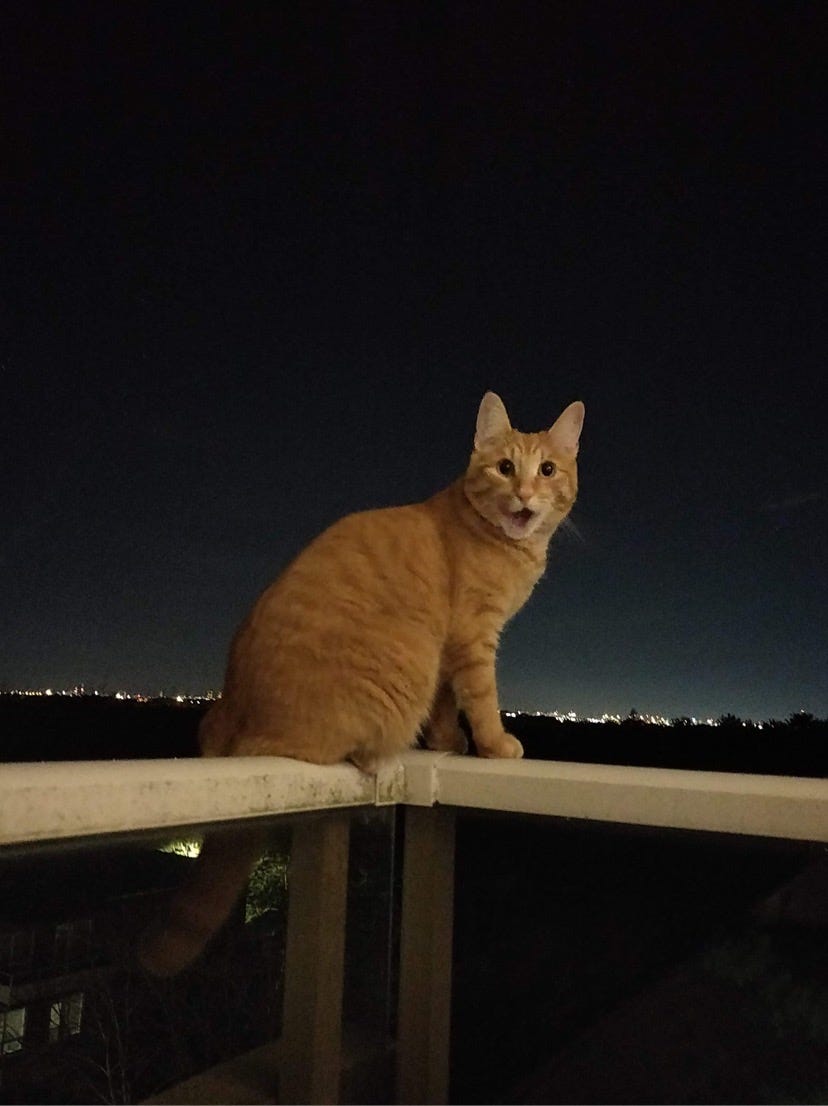On the second marshmallow
If you were a kid in the early 2000s, you’d remember those old agendas we used to have in elementary school. The ones they would hand out at the beginning of every September, with the holographic covers that would make a satisfying zipping sound when you scratched your nails against it. I used to scratch them and pretend I was a DJ. These agendas were a favourite of mine. I used to read all along the margins, which were littered with fun facts and trivia. For instance, did you know ants’ butts taste like salt and vinegar chips? That’s an agenda fact! There was always an abundance of knowledge hidden in plain sight, and I, a young voracious reader, gobbled up everything I could manage to get my hands on.
One particular memorable agenda fact was on the topic of marshmallows. It asked a simple question: if could have one marshmallow now, or told to wait 15 minutes but get two marshmallows, which would you choose? I don’t know if I was a particularly well disciplined or patient kid, perhaps just an obedient one, but I decided that I would wait, two marshmallows is better than one. The agenda then proceeded to explain that kids who waited for the second marshmallow did better in school and had better outcomes in life overall. Of course, later on, I would come to learn that this was the famous Stanford Marshmallow experiment on delayed gratification. But at the time, I was 8 and did not understand the theory behind all of this, all I knew was that waiting meant that you got two marshmallows, and so I decided at that very moment that I would always be a two marshmallow kind of kid, the kind that waits.
And so I did. Throughout high school, undergrad, med school and residency; I studied, stayed up through long nights at the library, at the anatomy lab, at the hospital, following through with the things that I needed to do, things that felt less than meaningful at times, things that were menial or dull or just purely difficult. But I would always get through it, because I rationalized all of this to be the equivalent of waiting, and waiting meant that there was something better at the end.
And it worked. I got everything I thought I wanted. If you told 15 year old me that I would be a practising MD at age 25, she would not believe it. She would think that there would be nothing more I could possibly want. That was the limit of my aspirations. It was as far as I had foreseen, and I had never stopped to question to picture what lay beyond that horizon. But the older I got, and the closer I got to this precipice, the more I began to realize that there was a cost to waiting. It is at times passive and narrow-minded, and closes us off to the possibility of spontaneity, of doing things not because it is responsible or safe or maximizes our longterm gains, but precisely because it is fun, or stupid, or allows us for a moment to just feel. I had made sacrifices in playing this waiting game. I realized that the experiences we deny ourselves in the name of a greater goal, might no longer be the same when try to make up for it years later. I came to this realization quite late, and at the worst possible time: during a global pandemic, where all we could do was to wait and with no sense of how long we would be waiting for.
I lived alone through the pandemic. My days consisted of going to the hospital, seeing patients, then going home, cooking dinner, resting, then going to bed. This was not what I pictured at the end of all my waiting. I wanted to travel, to see the world, to talk to strangers, to experience. But instead, I spent my evenings browsing the grocery aisles as if it was a pretend shopping mall, I practised how to smile behind a mask using just my eyes, and talked to my neighbour’s orange tabby Cheddar, my sole consistent companion, who would come trotting across the balcony every evening, meowing to be let in.
This new brand of waiting became my routine for so long, that I slowly got good at it. I found ways to make my time alone much more enjoyable. I bought a used typewriter and starting writing snail mail to pen pals all over the world. I discovered that the Salvation Army was one of the few stores still open, and I would go there to browse the old vinyl records until I slowly amassed a collection of my own. I made Youtube videos of me in my room singing on my ukulele or guitar, talking into the camera to all of my 7 subscribers. You can track my slow decent into insanity by counting the number of postcards I plastered onto my wall in the background, increasing from one video to the next, as I tried to cling on to any reminder that there was still a world out there, waiting to be seen.
It was around this time that I also started a blog. It was aptly named “The Time on our Hands”. I began to write and I didn’t stop — I had written about 30 or so articles over the course of 3 years. I wrote when I was happy, when I stressed, I wrote about anything and everything. I think I had no more than two readers, two of my best friends, but it didn’t matter, I wrote for myself, writing kept me sane. I stopped writing towards the end of the pandemic, and interestingly one of my last few posts was called “Waiting (no longer)”. It ends off with one of my favourite poems, also about waiting and but most importantly, about how good it is when the waiting is over.
After an eight year journey towards my MD followed by a three year global pandemic. I was done with waiting, I was done with delayed gratification, I wanted everything I had put off for the promise of a greater reward. I wanted small, short-lasting bursts of happiness, and I wanted it now. A month after graduating residency, I packed my bags and left for Europe. I lived for a month in Florence and a month in Paris, and used this as a base to travel the rest of the country. I met countless kind people, who welcomed me into their lives, even if just for a day. We shared food, music, stories and for brief moments in between, I would feel a rush of warm familiarity. Perhaps it is just empathy, or perhaps it is more, a flicker of recognition at the very essence that makes us human, ever-present in all of us. I am convinced that connection, this energy that occupies the space between two people, is the reason we get goosebumps listening to music or cry from a good book, it is the very essence that makes life feel transcendent.
I could write paragraphs about this. But I am getting sidetracked, and will save this for another time. There is a lot more to be said.
Whenever I return from travelling, I always fall into an inevitable withdrawal. The winter are cold and long in Canada, and the way our cities are structured compared to their European counterparts, makes it far more difficult to walk out your door and expect happiness to spontaneously befall upon you, the kind of happiness that travelling had now accustomed me to. And so, I slowly drifted towards quick hits of dopamine through other means— scrolling through instagram, going out to dance, getting a drink with a friend — a short burst of happiness which inevitably fizzles and is gone. This kept me afloat for a little while, until I realized recently that I have entirely become too dependent on these external hits of happiness. They are fast-acting and intense in their onset, but ultimately leave me unsatisfied in their withdrawal. But I did not know what the alternative was. I had forgotten how to wait for happiness.
Yesterday, I finished work and had an instinct to take to subway to Toronto. So I parked my car at Kipling and made my way downtown. The first thing I did was a kickboxing class at the gym, it was very intense and at one point I thought I was going to vomit. I realized I was holding onto a lot of tension only when I saw my reflection in the mirror and was taken aback by how angry my punches looked. Afterwards, I went to a poetry slam at a dimly lit tea shop, where I sat cross-legged, shoes-off on one of those middle eastern sofa things with lots of cushions. I listened to people share their writing — slam poetry, a novel they were working on, their creative writing thesis. I thought about my own writing. I thought about how fulfilling it once was to create, express. I thought about all the tension I held inside me, and how easily I succumb to it, and allow it to make me emotional, irrational, and reactive. I thought about the people around me, and how this affected them. And I thought about writing again. How it channels the chaos of thoughts and forces it to slow down, siphoning it out only as fast as I can type. How this calms me, and allows me rationalize, think, rather than constantly feel, feel, feel. Feelings are deceptively fast, and I am realizing that I need to slow down, in every aspect of my life. The problems I will face have no quick fix, no magical answer, the solution that work take time and steady effort. And in this process, it is okay to make mistakes, it is okay to be upset or have someone be upset at you, it is okay leave tension unresolved until the next day, until you can settle your emotions and the take time to work through things properly. There is no urgency. It is okay to wait. Nothing good gets away.
In order to slow down, I need to retrain my body to respond to a steady low flow of dopamine. I did yoga this morning, and loved the way I feel afterwards, clear minded, rational, with my parasympathetic system kicked into gear. I want to learn to enjoy the silence of my own company again, like I learned how to do in the pandemic. I want to spend nights writing, reading, singing. Even after the pandemic ended, I would travel alone, go to movies alone, or just spend evenings relaxing alone. I miss the enjoyment I used to be able to derive from it, and the lasting sense of peace that lingered afterwards.
I know I am still capable of it. I know how to wait.
I am a two marshmallow kid.
My very first youtube video. Start of the pandemic, slower times.




